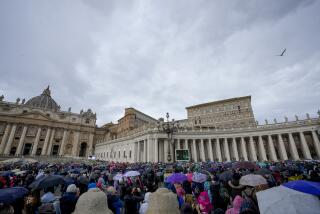Italian ‘Financier’ Casts Shadow Over MGM/UA Buyout
- Share via
Some weeks ago, self-proclaimed financier John Di Stefano of Beverly Hills landed in faraway Auckland, New Zealand, and told reporters he had $50 million or so to invest in local businesses.
To make his point, Di Stefano quickly cut deals to buy a shopping mall and a pair of motels.
A dazzled New Zealand Herald told how the newcomer’s Interpart Mergers & Acquisitions USA planned to build multiplex cinemas in Auckland and went on to quote his optimistic wisdom. “New Zealand has reached the bottom of its economic downfall, and the country provides wonderful investment opportunities,” Di Stefano said.
Interviewed by an Auckland television station, Di Stefano’s wife Tanja said the pair had come to buy a local broadcaster out of receivership but couldn’t resist the phenomenal values in New Zealand’s depressed real estate market. In her words: “We ran into so many opportunities it was just unbelievable. Every day, a new thing pops up.”
By last week, however, word of a criminal entanglement in England had also popped up. And the Di Stefanos’ New Zealand adventure, oddly enough, was threatening to become an embarrassment for Giancarlo Parretti, the Italian investor whose Pathe Communications Inc. is supposed to complete its $1-billion-plus acquisition of MGM/UA Communications Co. later this month.
This much is clear:
Auckland’s John Di Stefano--an Italian citizen who speaks with a distinct British accent, often uses the Italian name Giovanni and has homes in Beverly Hills and in England--is the same individual who filed a $280-million libel suit against Pathe in Los Angeles last April.
The suit, which is pending, claims that Pathe severely damaged the financier when it ran an advertisement in The Times earlier this year stating that “Mr. Di Stefano is not now nor has he ever been an officer or a director of Pathe Communications Corp.”
Di Stefano claims that he was indeed a Pathe director and a vice president in charge of mergers and acquisitions, and he has supplied the court with several internal Pathe documents that appear to support his claim.
Pathe quickly sued Interpart for more than $25 million, however, claiming that Di Stefano had breached an agreement to invest $10 million in Comfinance S.A., Parretti’s main holding company--and further claimed that he had concealed the fact that he was once “charged and convicted in the trial of a criminal matter” in Great Britain.
What remains less clear amid all the fuss is the extent of Di Stefano’s resources, how closely he was associated with Parretti and just how serious was the “criminal matter” that, as Di Stefano has acknowledged in interviews with The Times, did lead to his spending at least several days in a British jail at one point.
“When you’re in business, you’re going to be involved in court matters,” Di Stefano said in a recent interview. “Sometimes it’s civil, sometimes it’s criminal. I’ve been involved in both. But I’m clean.”
In the face of persistent questioning on the subject by the Auckland press, Di Stefano has strongly maintained that he is not the same Giovanni Di Stefano who received a five-year prison term in 1986 in connection with a major British bank fraud. He told The Times he once spent five days in jail after failing to post bond on a fraud-related charge, “and that’s the end of the matter.”
In any case, Di Stefano’s relationship with Parretti became an issue in Auckland when a New Zealand public relations firm representing the investor circulated an “information sheet” about him on Pathe Communications letterhead, even though Di Stefano doesn’t claim any continuing association with the entertainment firm.
The fact sheet listed Parretti’s son Mauro as one of the original directors of Interpart, which was formed last February. It said Mauro was “removed” from the board in March. Pathe attorney Ted Cohen on Friday disavowed the directorship, however. In his words: “I don’t believe Mauro ever accepted any position with Interpart.”
The same sheet listed the Di Stefanos and a godson, Claudio Tramanto, as 95% owners of Interpart. In a subsequent interview, however, John Di Stefano said Giancarlo Parretti actually owns half of Interpart--an assertion Cohen flatly denied.
Citing the litigation, Cohen declined to discuss the extensive documentation that appears to show Di Stefano did, in fact, play a significant role at Pathe for several months, beginning last November.
In a Nov. 22 internal Pathe memorandum submitted to the court, the company’s budget officer, Ed Braunshneider, asked a financial reporting officer, Steve Rath, to open a new “mergers and acquisitions” department. It was to be headed by John Di Stefano.
Subsequently, a Jan. 31 company personnel roster placed Di Stefano’s name just beneath President Parretti’s in a listing of the corporation’s eight top officers. Minutes of a Dec. 26 Pathe board meeting in Rotterdam, Netherlands, moreover, list “Giovanni Di Stefano” as one of five corporate directors who were absent.
In interviews, Di Stefano has claimed to be an architect of the plan under which Pathe is to buy MGM/UA with backing from Warner Bros. Yet a draft memorandum prepared by Pathe attorney Edmund Hamburger in response to a query from the market surveillance department of the New York Stock Exchange doesn’t list Di Stefano in any of the crucial conferences that, beginning last January, led to the announcement of an acquisition deal on March 7.
The same memo does show that Dino DeLaurentiis, a longtime Parretti friend, participated in several of Pathe’s key strategy sessions, beginning Feb. 24. “I don’t find that unusual,” Cohen explained. “He’s been Mr. Parretti’s adviser for many years.”
But Cohen said he couldn’t confirm Di Stefano’s claim that he initially became associated with Parretti thanks to a reference from his uncle, who, he said, has been De Laurentiis’ hairdresser for more than 30 years.
Di Stefano has maintained that Parretti broke with him after Di Stefano declined to make the Comfinance investment. Cohen said Pathe no longer expects the investment, lawsuit notwithstanding.
In a peculiar facet of his own lawsuit, Di Stefano asked $40 million in damages because, he said, Parretti’s disclaimer in The Times and elsewhere had cost him a pending appointment as “Consul General to the United States from Grenada.” Denneth Modeste, Grenada’s permanent secretary for external affairs, said in an interview that the supposed appointment is news to him.
“Strange things go on,” Modeste said on learning of the suit.
(Parretti, as it happens, enjoys official status as “ambassador-at-large” from the civil war-racked Liberia, according to a letter from the Liberian minister of state addressing him as such and extending thanks for a $1-million bank guarantee in connection with a Monrovia, Liberia, hotel management contract. Cohen said he didn’t know how Parretti acquired his diplomatic status, which, according to a U.S. State Department representative, isn’t recognized in this country.)
As for Interpart’s $50-million war chest, Di Stefano told The Times it is “10 to 15 million, actually,” most of it accumulated, he said, through real estate deals in Great Britain.
And, yes, Di Stefano added, he will soon return to Auckland, despite the questions of an increasingly skeptical New Zealand press corps.
“There are opportunities there,” he explained. “You can buy real estate for almost nothing. . . . And what’s the big deal about buying a few motels?”
More to Read
Inside the business of entertainment
The Wide Shot brings you news, analysis and insights on everything from streaming wars to production — and what it all means for the future.
You may occasionally receive promotional content from the Los Angeles Times.









